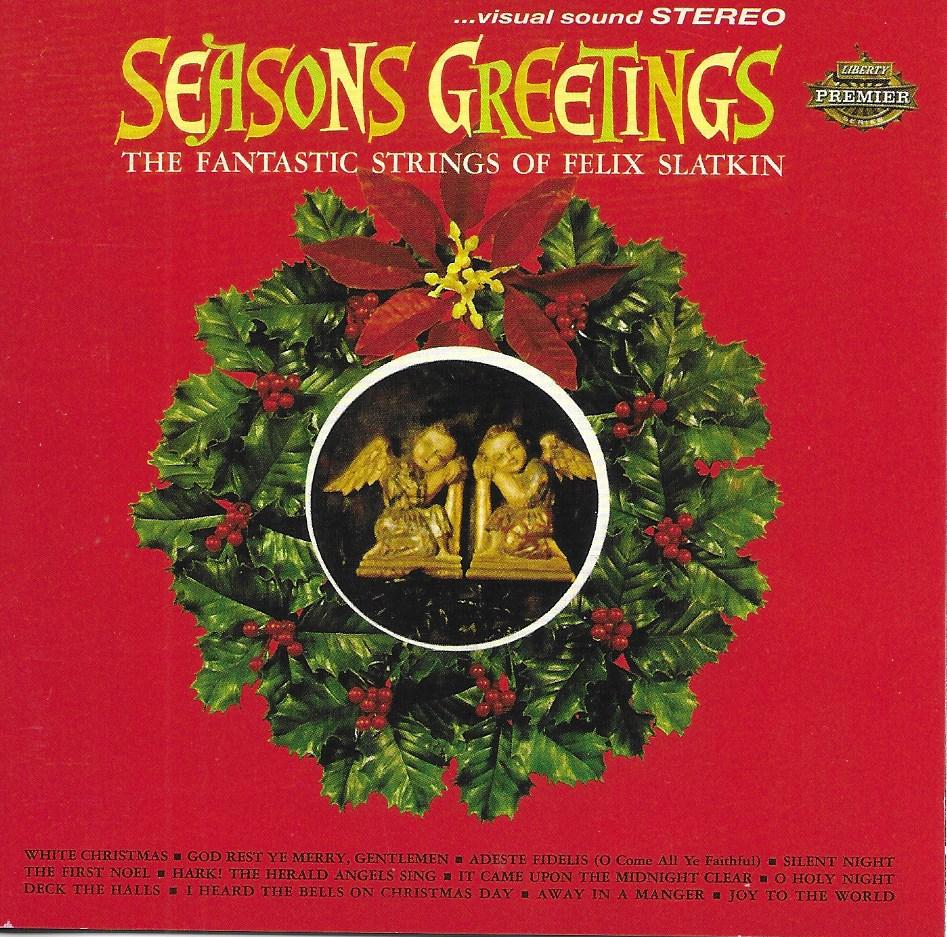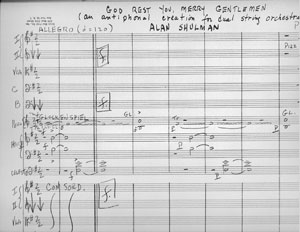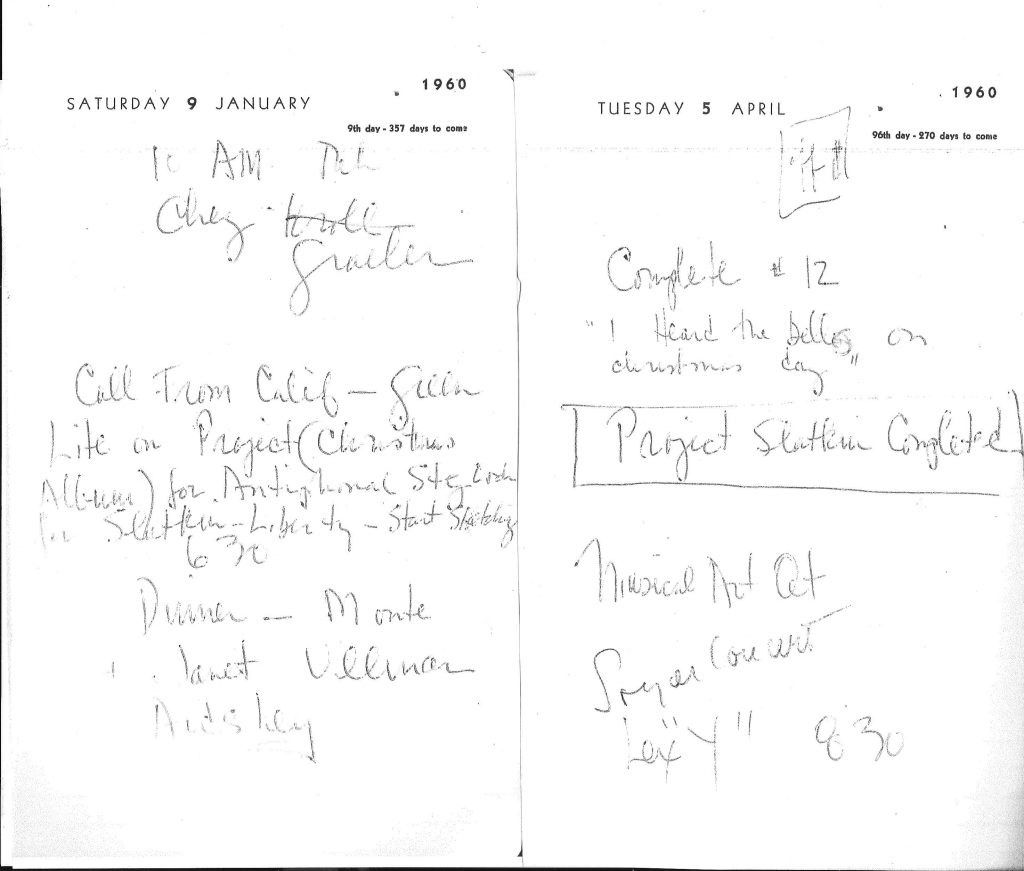We are delighted that after many years, Capitol Records has reissued a CD of ‘Seasons Greetings,’ the classic 1961 Liberty Records’ release by The Fantastic Strings of Felix Slatkin. Remasterd by Mike Milcher at SonicVision, the booklet reproduces the original album jacket and includes an essay ”A Holiday Journey with Felix Slatkin” written by his son, conductor Leonard Slatkin. Leonard’s notes honor the legacy of his talented parents; violinist and conductor Felix, who was concertmaster at 20th Century Fox and conductor at the Hollywood Bowl, and who, with his wife Eleanor Aller, principal cello at Warner Bros., together founded the Hollywood String Quartet and made a series of important recordings for Capitol Records in the 1940s and 50s.

The booklet notes also tell the story of the making of Seasons Greetings. But there is more to the story:


Eleanor Aller, and Alan Shulman and his future wife Sophie Bostelmann had met at Juilliard in the 1930s. The Slatkins and the Shulmans were long-time colleagues and friends. New Year’s eve, 1959-60 Alan and Sophie hosted Felix and Eleanor and other friends at their new home, Powdermill House, in Scarsdale. The Slatkins brought along the brilliant young violinist Michael Rabin. During the course of the evening, Felix proposed that Alan arrange an album of Christmas carols for Liberty Records. He told Alan that he would receive album credit and would be paid royalties. How do I know? I was there. They discussed the stereo concept, antiphonal strings, with the right channel orchestra muted for greater stereo effect. The harp (a favorite of Alan’s) celeste, glockenspiel, and chimes were placed in the center. Felix told Alan he would confirm details upon his return to Los Angeles.
The project, as entered in Alan’s 1960 datebook, progressed as follows:
Saturday, January 9, 1960: ”Call from Calif – Green Lite on Project (Christmas Album) for antiphonal string Stg Orch for Slatkin – Liberty – Start Sketching 630” / Sunday, January 10: ”Complete Sketch + Arr. #1 (First Noel)” / Wednesday, January 20: ”Score #2 for Felix God Rest ye, Merry Gentlemen / Monday January 25: Sketch #3 (It Came Upon a Midnight Clear)” / Tuesday January 26: ”Score #3) / Wednesday January 27 ”Sketch + partially score #4 (Adeste Fideles) / Monday, February 1 ”Complete Sketch and Scoring of #4 (ADESTE FIDELES) / Thursday February 4: ”Work on Score #5” / Saturday February 6:”Completed Scoring on #5 (Hark! The Herald Angels Sing) / Thursday February 11: (Work on #6) / Friday, February 12: ”Complete #6 (Deck The Halls) Sketch + Score #7 (Silent Night) / Monday February 29: ”Complete Scoring on #8 (O Holy Night) / Friday March 4: ”Complete Sketch and Scoring of #9 (White Christmas) / Saturday March 5:”Sketch # 10 (Joy to the World)” / Tuesday March 15: ”Sketch #11 (Away in a Manger) / Saturday March 19 ”(Complete #11 AWAY IN A MANGER)” / Monday April 4: ”work on # 12” Tuesday April 5: ”Complete #12 I heard the bells on Christmas day” [Project Slatkin Completed]”
(The dozen charts were completed in 3 months during which Alan also played numerous record dates, NBC television shows, edited several original compositions for publication, had social engagements, attended concerts and rehearsed and performed the Brahms Double Concerto with his brother Sylvan.)
Alan sent the scores off to Felix. A year later however, when the Liberty LP was released bearing the attribution ”White Christmas (Irving Berlin) – Publisher Irving Berlin Music (ASCAP) All Other Selections Arr. by Felix Slatkin – Publisher Metric Music – BMI,” Alan felt betrayed. While he had been paid for the arrangements, he filed a lawsuit which, as Leonard writes, was eventually settled out of court.
The arrangements are in Alan’s sophisticated arranging style of the late 1950s – his extraordinary harmonic and orchestration sense, and his use of counterpoint, key choice and modulations, plus clever nods to Brahms, Thomas, Handel, ‘Jingle Bells’ in ‘White Christmas’ etc. – and are techniques he used in charts he wrote for, and were recorded by, Skitch Henderson and Raoul Poliakin. Alan’s arranging skills (he had taught orchestration to Nelson Riddle) were why Felix asked Alan to arrange the project in the first place. Felix died at 47 in 1963. Lawsuit notwithstanding, the estrangement didn’t last long. In June, 1964, Eleanor brought her son Fred east and Alan wrote a cello quartet ”Two Pair” which the four of us played when they visited Scarsdale. That October, Leonard, who was studying at Julliard, was also guest in our home.
When Alan died in 2002, the New York Public Library requested Alan’s archives. I subsequently donated to the Lincoln Center Library Alan’s original sketches and scores for Seasons Greetings. Both are in Alan’s hand. I went to the Library of Congress and called for the copyright copy of the scores. At the top of each score, pasted over ”Alan Shulman” was ”Felix Slatkin” and on the bottom © 1961 Metric Music. Alan had neglected to copyright the scores in his own name and Felix treated them as a work for hire.
‘Seasons Greetings’ is Alan Shulman’s arranging masterpiece – no matter whose name appears on the album or the scores in the Library of Congress. The recording has been a favorite in our house for more than 60 years, and now that the CD reissue has made it available again, we hope it will be in yours as well.
– Jay Shulman
